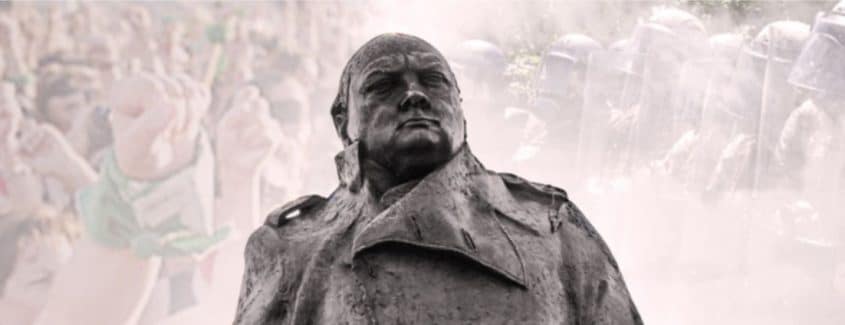
Editor’s note: A shorter version of this article first appeared at Newsweek. Dr. Gary Scott Smith is the author of the new book, “Duty and Destiny: The Life and Faith of Winston Churchill.”
During his long life, Winston Churchill suffered several indignities. He was dismissed from his position as the head of the Royal Navy in 1915 because of the disastrous defeat Anglo-French forces endured at Gallipoli during World War I. His decision as the chancellor of the exchequer to return Britain to the gold standard in 1925 was a financial catastrophe. During the 1930s, Churchill’s so-called “Wilderness Years,” his party denied him a leadership position. His greatest ignominy was being ousted as prime minister in a July 1945 election after Britain’s triumph in World War II.
 None of these embarrassments compares, however, with the current assault on Churchill’s reputation. His statue in Parliament Square in London has been boxed up after being defaced by protestors, and his bust has been removed from the Oval Office. More significantly, at a recent academic conference titled “Racial Consequences of Mr. Churchill,” held ironically at Churchill College at Cambridge University, scholars sought to smash his exalted status to smithereens. Participants denounced Churchill as a racist murderer, decried him as “the perfect embodiment of white supremacy,” credited Soviets and Americans (rather than Britain) with winning World War II, and castigated the British Empire as morally inferior to the Third Reich.
None of these embarrassments compares, however, with the current assault on Churchill’s reputation. His statue in Parliament Square in London has been boxed up after being defaced by protestors, and his bust has been removed from the Oval Office. More significantly, at a recent academic conference titled “Racial Consequences of Mr. Churchill,” held ironically at Churchill College at Cambridge University, scholars sought to smash his exalted status to smithereens. Participants denounced Churchill as a racist murderer, decried him as “the perfect embodiment of white supremacy,” credited Soviets and Americans (rather than Britain) with winning World War II, and castigated the British Empire as morally inferior to the Third Reich.
Keinde Andrews, a professor of black studies at Birmingham City University, argued that the British Empire was “far worse than the Nazis.” It lasted much longer and killed many more people. Andrews earlier accused Britain of being “built on racism” and called RAF airmen who bombed Nazi Germany, in response to Churchill’s orders, war criminals.
Professor Priya Gopal, Professor of Postcolonial Studies at Cambridge, lambasted Britain’s “national silence” about its racist past and insisted that the conference sought to counterbalance the “heavily skewed national story that has preferred untrammelled glorification to a balanced assessment” of Britain and Churchill’s role in history. Other conferees claimed that Churchill’s policies in India led to mass starvation in Bengal in 1943.
Andrews also belittled Churchill’s contribution to Britain’s success during World War II. “’Was it Churchill out there fighting the war?” he asked. “I’m pretty sure he was at home.”
Churchill still has his defenders, led by Andrew Roberts, author of Churchill: Walking with Destiny. Countering the arguments of conferees, Roberts asserts that throughout his long political career Churchill repeatedly fought to defend “the rights of non-whites within the British Empire.” Moreover, Churchill was “instrumental in destroying the worst racist in history, Adolf Hitler.” If the Japanese had gained control of India during World War II, Roberts contends, it might have led to tens of millions of deaths, given what the Japanese did in other theaters of the war.
Churchill’s detractors seem to think he was born with a silver spoon in his mouth and left the tough fighting to others. His father, Lord Randolph Churchill, was a member of Parliament, but he endured many financial and personal struggles. Lord Randolph and his American wife, Jennie Jerome Churchill, were distant, aloof, and preoccupied with their own lives and largely neglected Winston during his childhood. Lord Randolph died when Winston was 20, and Jennie had an estimated 200 sexual liaisons during her life.
Churchill contracted pneumonia as child, almost drown as a teenager, and at age 18 spent three days in a coma after falling 30 feet from a bridge. He fought in numerous battles with the British cavalry, narrowly avoiding death several times, and escaped from a prison in South Africa during the Boer War in 1916. While serving in the trenches in France during World War I, Churchill was nearly blown up by an artillery shell.
In The Splendid and the Vile, Eric Larson vividly describes how Churchill risked his life during World War II. He often watched the German bombing of London from rooftops instead of retreating to air-raid shelters. And during the war, Churchill flew about 112,000 miles and inspected British troops at the fronts, sometimes venturing so close to enemy lines that his generals feared for his life. He made numerous trips to France and six to the Unites States and travelled to Morocco, Iran, Moscow, and Yalta.
Yes, Churchill had flaws. He was powerfully influenced by the imperialist, racist, sexist ethos of his age. He believed that racial, class, gender, and religious hierarchies reflected God’s intentions for the created order. In defending “Christian civilization” and the benefits of the British Empire, he often affirmed values that clashed with Christianity’s emphasis on service, sacrifice, and racial and gender equality. He resisted giving self-government to British “possessions.”
 Nevertheless, throughout his life, Churchill took many courageous stands. Rebuffing Tory protectionists, he championed free trade. Unlike most of his aristocratic peers, he supported high taxes on the affluent and pensions for elderly. He pointed out the Nazi threat in the 1930s when most British leaders wanted to ignore it.
Nevertheless, throughout his life, Churchill took many courageous stands. Rebuffing Tory protectionists, he championed free trade. Unlike most of his aristocratic peers, he supported high taxes on the affluent and pensions for elderly. He pointed out the Nazi threat in the 1930s when most British leaders wanted to ignore it.
His greatest contribution was comforting, inspiring, and empowering the British people to resist the Nazis during 1940-1941 when Britain stood virtually alone and invasion seemed imminent. As theologian Reinhold Niebuhr argued, Churchill was “gifted with every art and wisdom of statesmanship” and courageously led Britain during “the world’s darkest hour.” Journalist Charles Krauthammer correctly claimed that Time magazine should have chosen Churchill rather than Albert Einstein as its person of the 20th century. Only Churchill possessed the “absolutely required criterion: indispensability.” Without him the world today would be “dark, impoverished, [and] tortured.”
In a 2002 BBC poll, Churchill was named the greatest Briton of all time, beating out William Shakespeare and Charles Darwin. Would a new poll in this woke age produce the same result? We should acknowledge the shortcomings and misguided policies of all leaders, but remembering their social and political contexts, we should provide a balanced assessment of their actions.

